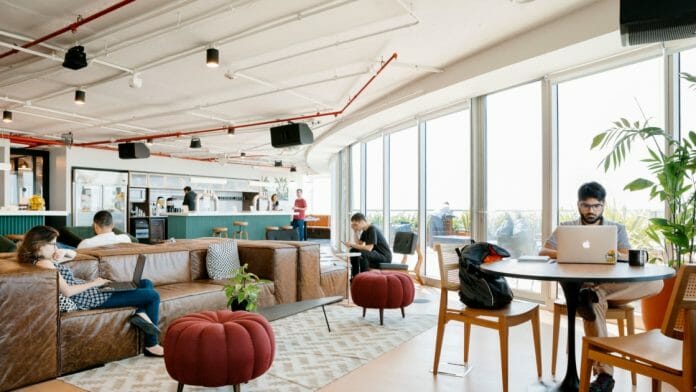By WeWork Pacific Spokesperson,
Malaysia’s Recovery Movement Control Order (RMCO) has now been extended until the year’s end, and in this ‘new normal’ businesses have needed to adapt and rethink their strategies in the face of a constantly evolving environment.
With a greater emphasis placed on safety, hygiene and cleaning measures, not to mention professional distancing practices, the future of work is one which sees companies needing to strike a balance between driving growth while maintaining operational and cost efficiency.
Whether to meet scalability needs or as a means of future-proofing the business, pivoting to space-as-a-service providers can prove to be a smarter long-term strategy for companies in Malaysia. By moving away from fixed workspace commitments, re-allocating budget to other key business priorities can help keep businesses afloat.
Here are four reasons why co-working spaces are a practical choice as companies recover and face the ‘new normal’:
- Adding flexibility to businesses
Covid-19’s impact on the economy has shown the need for organizations to take a conservative approach when it comes to operational needs such as lease flexibility. In an increasingly fluid environment, this gives enterprises of all sizes the ability to scale the amount of space dependent on their needs.
Resilient enterprises will rely even more heavily on real estate flexibility, where success of their businesses in the short term depended heavily on how nimble they were able to adjust to new work norms. For instance, during this period, businesses had to make quick operational decisions and WeWork’s ability enabled them to scale 3x faster than traditional options. By bringing agility to their portfolio with flexible terms and innovative deal structures, businesses have also saved up to 50 percent of committed costs.
This also points to growing trends among larger enterprises moving towards an on-demand model, where many are quickly innovating their global real estate strategy and forging strong partnerships with flexible workspaces. IDC’s recent report, Future of Work: Coworking for Enterprises (A Southeast Asian Perspective), predicts that by 2021, 60% of Global 2000 companies will have adopted a future-workspace model that is flexible and intelligent with a collaborative virtual/physical work environment.
- Empowering sustainable work arrangements
The shift to remote working during the pandemic has proved that there are alternative and flexible workspace arrangements to creating a productive work environment. However, remote working goes beyond simply working from home. Ultimately, the future points to a hybrid of flexible workspace arrangements.
As the RMCO has seen many businesses transition back to the office, there is now a question of how professional distancing is shaping the new work order. Employers need to take into consideration employees’ safety and wellbeing alongside considering how to balance work resources, productivity, and collaboration.
A flexible workspace is able to provide and meet all the demands of its members, from addressing cleaning and sanitization needs to fostering an environment that is conducive to teamwork, innovation and connection, providing teams with the needed essentials to increase efficiency and productivity.
- Supporting business continuity efforts
Business continuity plans (BCP) are critical for riding out a crisis, specifically from a workspace perspective to instill confidence in business operations.
The Covid-19 pandemic has demonstrated the importance of having BCP strategies in place, regardless of industry or the size of a company. Throughout the early stages of the MCO and beyond, WeWork has had many conversations with members and non-members to better understand the importance of space-as-a-service as part of their business continuity planning strategy.
There will continue to be upward trends of organizations committing to strengthening their BCP strategies, specifically from a workspace perspective to instill confidence in their operations. In addition to supporting collaboration and productivity, a co-working space’s role is also to help its members drive business efficiency – offering flexible services, tools, and strategy that can help businesses be well-equipped and future-proof their operations.
- Having a sense of community
Co-working spaces come with a built-in benefit of a diverse community. This opens up opportunities for employers to preserve company culture, employee integration and experience to drive productivity, motivation and connection.
The current climate calls for work environments that foster collaborations that also facilitates engagements between the private and public sectors. Maintaining collaboration between business groups and the government will be a key part of rebuilding our economy. Most enterprises, individuals included, find that shared spaces increase their commissions and connections, expand their business, create jobs, and stimulate the economy.
Malaysia’s burgeoning digital economy also lends itself to a workforce that is increasingly agile and entrepreneurial. To that effect, IDC reports that over 20 percent of Malaysian organizations have adopted co-working spaces in their operations and have seen success from the collaborative environment.
It is clear that the new work order is indeed upon us and there is no going back to the way it was. As the nation and economy continues to adapt under the ongoing RMCO for the remainder of 2020, the task for businesses is to adapt both efficiently and effectively in a concerted effort towards recovery.
The flexible workspace sector itself in Malaysia is expected to be a growth driver as it offers alternatives to businesses who are looking to enhance their operational flexibility and efficiency in the coming months. Indeed, WeWork has been adept at reinventing the workspace to support modern employees, by setting the bar with best practices reflective of the new normal. Its products, design, and services have been revamped to meet members’ new expectations from professional distancing to cleanliness standards.
By implementing a renewed workplace standard across its locations, members are ensured of a smooth transition back to the workplace. All these were done while maintaining its strengths as a partner of choice for turnkey, thoughtful, and diverse space solutions.









